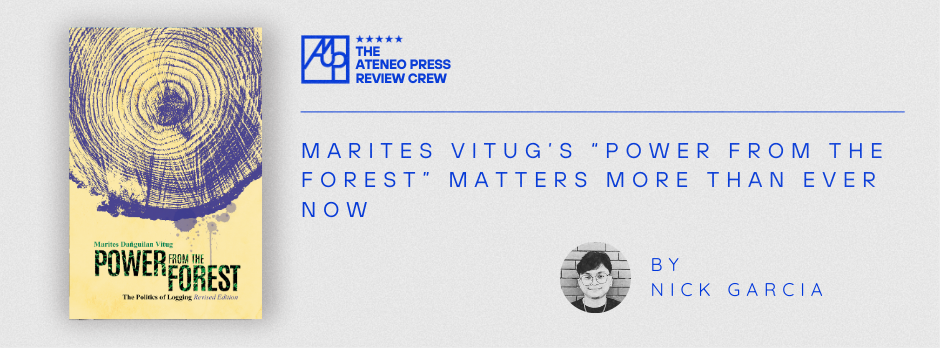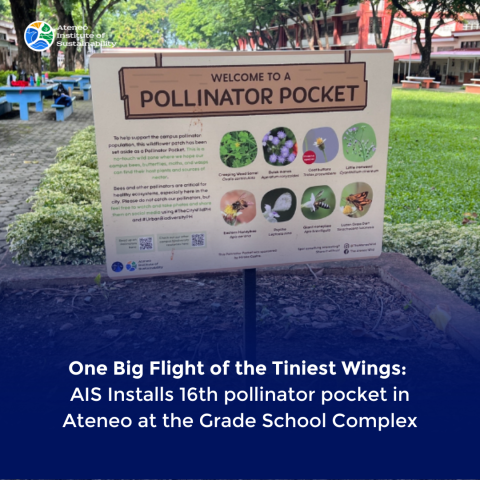[Ateneo Press Review Crew] Marites Vitug’s Power from the Forest matters more than ever now
17 Jun 2025 | Nick Garcia
Much has been said about everything being political. The 11.11 sale shirt you’re wearing, the fast-food restaurant you constantly order from, the Reel popping on your Instagram feed during a casual afternoon scroll, the very air that you breathe in.
It’s not Facebook virtue signaling or Twitter activism, especially the last part. As the most vital human life resource, clear air is essential. But, at this point, it’s just too dirty already. (The Philippines placed 74th out of 138 countries in the 2024 World Air Quality Report of IQAir, a Swiss company that monitors global air quality in real-time.) No thanks to dirty smoke-belching activities, dirty carbon emissions, dirty business interests, dirty government policies.
The government and businesses, of course, are the ones pushing the buttons. For instance, projects involving urban expansion, infrastructure, or commercial zones require the cutting of trees, our natural air filters. It goes without saying that it’s not just dozens of trees destroyed due to these projects, but rather hundreds of thousands—even millions—covering thousands of acres of forest. It goes without saying that it’s not only fatal to wild animals but also to human beings.
It’s a perennial problem, especially in the Philippines, and Filipinos must inform themselves. Those who cannot remember the past are condemned to repeat it, after all. The best way to be informed is by reading veteran journalist Marites Vitug’s Power from the Forest: The Politics of Logging, her 1993 investigative journalism book that has a 2023 revised edition under the Ateneo de Manila University Press.
In Power from the Forest, Vitug reported how corrupt politicians, including those in the Department of Environment and Natural Resources, of all offices, have connived with loggers in pillaging our forests. Much of the destruction took place during the martial rule of dictator Ferdinand Marcos, who used logging concessions to return favors to his cronies.
Though the 1986 EDSA People Power toppled the Marcos dictatorship, the succeeding administrations faced difficulties in undoing the already widespread damage. In particular, Vitug discussed how things unfolded at the post-EDSA Senate regarding a bill seeking a total log ban in the country, which divided the senators. The House of Representatives, meanwhile, was on the fence toward such a ban, especially since many names of old were in deep when it comes to the logging business. Vitug delved into the names of major players involved and how they acted and not acted.
The book isn’t all doom and gloom though, as Vitug also covered optimistic stories: the successful pushbacks from forest communities and environmentalists, the efforts of several organizations in conserving the forests, the genuine politicians who championed the forests, and the roles of IPs and other rural folk in protecting such sanctuaries.
Vitug also told the stories of the Armed Forces of the Philippines, the New People’s Army, the Lumads and other tribal communities, and how forests affected their lives, with respect to the political and business decisions at the time.
She discussed these issues in 10 chapters across over 200 pages, making her book a comprehensive and authoritative resource material on the environment and how it’s deeply rooted in politics which, like the air we breathe in, is vital and all-pervading.
The 2023 edition has annotations that provide readers with important updates to the 1993 book, making it in conversation with the present.
In fact, Power from the Forest matters more than ever now. The Marcoses have clawed their way back to power in several local and national positions post-EDSA, culminating with Ferdinand’s son and namesake winning the presidency in 2022. In his blurb, Ruben Carranza, former commissioner of the Presidential Commission on Good Government, reminds climate justice activists and anti-corruption and human rights advocates that the book is a “resource for holding the Marcoses accountable for the damage they have done to Philippine forests.”
Moreover, the Philippines is holding its midterm elections on May 12. There are still many candidates, especially those hailing from political dynasties, with no concrete platforms—especially those that address deforestation and other environmental concerns. Yet, they are bound to win anyway, no thanks to traits like their surnames, looks, dirty jokes, and dance moves.
The book has also become relevant anew with fresh environmental assaults in recent memory. In March 2024, a resort in the middle of Chocolate Hills made the headlines, raising questions on why local officials allowed its construction in a protected area. On March 7 this year, the DENR announced that it’s cancelling its supplemental agreement with Blue Star, the firm that developed Masungi Georeserve, which has been damaged by mining, logging, and other illegal activities. (Blue Star must vacate Masungi soon, while the DENR said it will protect the area despite the cancellation of their agreement.)
In his foreword to the 2023 edition, Tony La Viña, an environmental lawyer who served as a DENR undersecretary, said the new generation still “needs to know the past, understand the power dynamics that led to the destruction of our forests, so they are more effective than those of us who fought these battles in the 1980s, 1990s, and the early 2000s.”
This 2025, deforestation remains rampant and isn’t easily offset by several noble efforts. Corrupt officials have never truly left and are still pretty much in cahoots with some big corporations, still pillaging the environment to this day.
Here’s the big picture: Climate change is getting worse. The World Health Organization has warned that between 2030 and 2050, there would be about additional 250,000 deaths annually due to undernutrition, malaria, diarrhea, and heat stress alone. Heatwaves, wildfires, floods, tropical storms, and hurricanes would also increase in scale, frequency, and intensity.
Power from the Forest is definitely not an easy read due to its subject matter. What adds to that unease is the book’s length. People need more time than usual to digest it, at a time when time is becoming a luxury.
But since Vitug writes with much clarity and precision, things are bound to be smooth and manageable. The reader’s patience will surely be rewarded as their knowledge is boosted, emotions are stirred, and humanity is reinforced. Rest assured that they’d finish enlightened, if not also disillusioned, with what happened and what’s still happening now.
More importantly, Vitug’s work is a must in this era when fast-paced and bite-sized content, especially celebrity tsismis, is causing much brain rot to social media users, and when trolls use disinformation to hyperactively burn and clear our digital forests. Many Filipinos have been taking in too much air of ignorance and apathy—the reason why politicians whom Vitug talked about remain in power.
As mentioned, those who cannot remember the past are condemned to repeat it. All the more reason that Vitug’s work must be read. Everybody is breathing the same air, after all.










